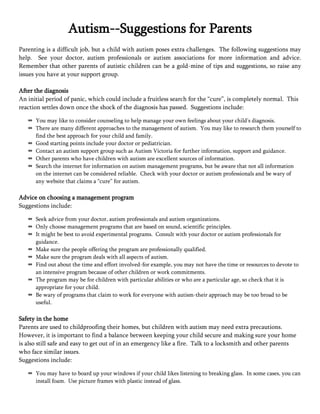
Autism suggestions for parents
- 1. Autism--Suggestions for Parents Parenting is a difficult job, but a child with autism poses extra challenges. The following suggestions may help. See your doctor, autism professionals or autism associations for more information and advice. Remember that other parents of autistic children can be a gold-mine of tips and suggestions, so raise any issues you have at your support group. After the diagnosis An initial period of panic, which could include a fruitless search for the “cure”, is completely normal. This reaction settles down once the shock of the diagnosis has passed. Suggestions include: ∞ You may like to consider counseling to help manage your own feelings about your child’s diagnosis. ∞ There are many different approaches to the management of autism. You may like to research them yourself to find the best approach for your child and family. ∞ Good starting points include your doctor or pediatrician. ∞ Contact an autism support group such as Autism Victoria for further information, support and guidance. ∞ Other parents who have children with autism are excellent sources of information. ∞ Search the internet for information on autism management programs, but be aware that not all information on the internet can be considered reliable. Check with your doctor or autism professionals and be wary of any website that claims a “cure” for autism. Advice on choosing a management program Suggestions include: ∞ Seek advice from your doctor, autism professionals and autism organizations. ∞ Only choose management programs that are based on sound, scientific principles. ∞ It might be best to avoid experimental programs. Consult with your doctor or autism professionals for guidance. ∞ Make sure the people offering the program are professionally qualified. ∞ Make sure the program deals with all aspects of autism. ∞ Find out about the time and effort involved-for example, you may not have the time or resources to devote to an intensive program because of other children or work commitments. ∞ The program may be for children with particular abilities or who are a particular age, so check that it is appropriate for your child. ∞ Be wary of programs that claim to work for everyone with autism-their approach may be too broad to be useful. Safety in the home Parents are used to childproofing their homes, but children with autism may need extra precautions. However, it is important to find a balance between keeping your child secure and making sure your home is also still safe and easy to get out of in an emergency like a fire. Talk to a locksmith and other parents who face similar issues. Suggestions include: ∞ You may have to board up your windows if your child likes listening to breaking glass. In some cases, you can install foam. Use picture frames with plastic instead of glass.
- 2. ∞ Some children with autism are experts at escaping the most secure homes. Talk to a locksmith about installing lockable security doors on all exterior doors and window locks-but make sure you can still get out quickly in an emergency. ∞ Use key-lock door knobs (or bolts or chains installed high on interior doors) to keep your child in their room at night, or to block access to certain rooms. ∞ Fence your front and back yards. ∞ There is no medical reason to bathe your child daily. If your child resists bathing, aim for one or two baths per week-at other times, clean them as best you can with a damp cloth. ∞ The fear of water can be overcoming by the novelty of swimming pools, showers or jumping over lawn sprinklers. ∞ Some children with autism detest getting their fingernails and toenails cut. You could try teaching them to do it themselves (with nail clippers), or else perform the job while they are asleep. ∞ If your child is sensitive to getting their hair cut at the hairdressers, try hugging them in your lap. Regularly brushing your child’s hair may “desensitize them to getting their hair cut. ∞ Try cutting their hair yourself. If this is too difficult, cut their hair as best you can while they are asleep. Clothes Many children with autism tend to take their clothes off whenever they can. Suggestions include: ∞ Ask your child why they want to take their clothes off. They may be able to tell you what’s irritating them. ∞ Your child may be overly sensitive to the feeling of clothes against their skin. Consult with your occupational therapist for help to develop a “desensitization” program. ∞ Choose soft fabrics, preferably cotton. ∞ Avoid clothing with tight waistbands, collars or cuffs. ∞ Remove clothing tags that may rub against their skin. ∞ Try dressing them in clothes that are difficult to remove, such as overalls or jumpsuits. ∞ Choose shirts, dresses and pants that button at the back. ∞ Replace zippers, Velcro, buttons and other easily opened fasteners with more complicated options. ∞ If your child constantly removes their nappy, check that it’s comfortable. Try switching brands. Going out Suggestions include: ∞ Try to have another adult with you to help out if needed. ∞ Choose “family restaurants” or chain restaurants that don’t expect perfect behavior from young patrons. ∞ Take books, pens and toys for your child to play with. ∞ When eating out or shopping, try to choose non-busy times. ∞ Reinforce good behavior with plenty of praise. ∞ Try to avoid delays. For example, book the first appointment when visiting the doctor or dentist. Things to remember ∞ Parenting is a difficult job, but a child with autism poses extra challenges ∞ See your doctor, autism professional, autism associations or other parents at you support group for more information and advice. **Provided by Better Health Channel---www.betterhealth.vic.gov.au
